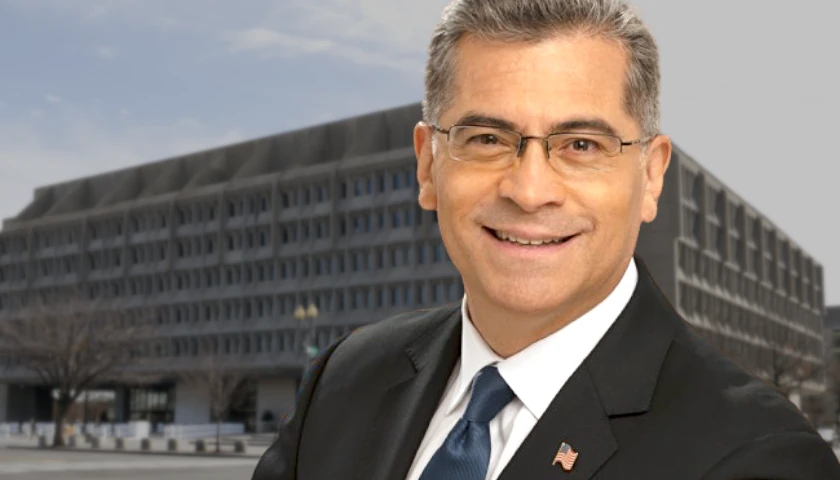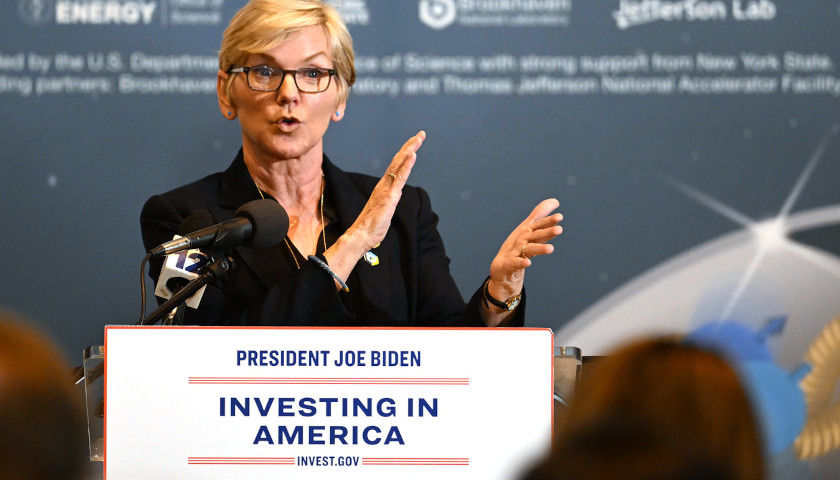by Greg Piper
As the second Trump administration prepares to commandeer the regulatory apparatus, blue states may be hoping the Supreme Court strikes down Biden administration demands on red states to protect them from the same treatment under President Trump.
More than 20 states, nearly as many federal lawmakers and dozens of conservative, pro-life and religious groups asked SCOTUS to overturn a ruling that refused to block the Department of Health and Human Services from cutting off Oklahoma’s Title X family planning funds for not giving women information about abortion.
Like many red states, Oklahoma further restricted abortion after SCOTUS scrapped federal abortion rights and returned the issue to the states in the Dobbs ruling.
A split 10th U.S. Circuit Court of Appeals panel saw no problem with HHS saying it was “unambiguous” that Title X requires recipient states to provide “nondirective counseling and referrals for all family-planning options, including abortion,” regardless of Dobbs.
Oklahoma must at least take the compromise HHS offered, a “national call-in number” for Oklahomans to access “neutral information” including for abortion, if it wants Title X money.
The Denver-based appeals court reinterpreted a 20-year ban on HHS funding for agencies that discriminate against entities that refuse abortion referrals, the so-called Weldon Amendment, saying a call-in number with abortion information did not necessarily count as a “referral.”
Oklahoma filed a petition with SCOTUS last month, arguing the decision created a circuit split and it’s at risk of “substantial bureaucratic intrusion on state sovereignty, federalism, and the separation of powers, in direct defiance of a straightforward congressional mandate.” Friend-of-the-court briefs rolled in this week.
The case raises large questions about when and what strings can be attached to federal money and the leeway federal agencies have to reinterpret congressional statutes, especially in light of SCOTUS reversing its 40-year-old precedent on “Chevron deference” this year.
A ruling for Oklahoma could also hamstring the incoming administration. A former Trump administration official warned this fall that the Title IX regulation she helped write – still binding where the Biden regulation is blocked – could be vulnerable due to Chevron‘s demise.
It mirrors another fight over the same regulation requiring abortion-inclusive nondirective counseling. Many of the same groups asked the full 6th Circuit to rehear the case brought by Tennessee after a panel blessed its exclusion from Title X funds on the same basis.
Republican attorneys general said even if the 6th Circuit upheld a kind of “zombie Chevron,” it would not authorize agencies to “attach thousands of strings to billions of federal dollars.”
Texas Attorney General Ken Paxton and 20 colleagues argue in their brief against the 10th Circuit that it ran counter to the 4th, 5th, 9th and 11th circuits on whether “any agency can impose conditions on Spending Clause legislation that Congress did not expressly provide.”
“This Court recognized over thirty years ago that Congress has never unambiguously required States to provide abortion referrals to receive Title X funding,” and HHS is violating “at least three different clear-statement rules that this Court recognizes,” they told SCOTUS.
The Biden administration waved off the explicit ban on Title X funds for “programs where abortion is a method of family planning” and the 10th Circuit at best ignored ambiguity in the statute when it approved abortion referrals that violate state law, an issue “rife with political and moral significance,” the attorneys general said.
The issue affects 41 states with legislative abortion restrictions, including Texas and a dozen other states that ban elective abortion entirely, the brief says. It also notes Congress has put the Weldon Amendment “as a rider on every HHS appropriations bill since 2004.”
The issue solidly belongs to legislators and voters, as made clear by abortion ballot initiatives this election in 11 states and the Texas Supreme Court upholding its elective ban against state constitutional challenges, they said.
SCOTUS must resolve whether congressional authority on funding conditions “can be delegated to an agency,” the AGs said.
Sen. James Lankdford and Rep. Tom Cole, Oklahoma Republicans, led their state congressional delegation, joined by Louisiana, Montana and Mississippi senators and nine House members, in asking SCOTUS to take Oklahoma’s case.
The feds have recently contradicted themselves on their interpretation of conscience protections, the brief argues, pointing to ongoing litigation over Idaho’s elective ban and outgoing HHS Secretary Xavier Becerra (pictured above) testifying that a state that lost Title X funds over abortion referrals couldn’t get them back by offering the call-in number.
Congress passed the Weldon Amendment “as a broad conscience protection to fill in the gaps of existing conscience laws, especially for health care institutions,” it protects “all objections” to abortion referrals regardless of reason, and legal precedents interpret objections “from the perspective of the objector” – their sincerity, they said.
It was exceedingly specific with new conscience protections in the three decades before the Weldon Amendment, which blew open the doors to “any other kind of health care facility, organization or plan” that Congress didn’t specifically name, applies to “all HHS appropriations” and prevents entanglement with abortion in any way, the brief states.
Before the amendment, objectors were repeatedly forced to perform abortions, denied licenses and approvals for refusing and even banned from conditioning the sale of their property on non-abortion purposes, members said, citing examples from Alaska to New Jersey.
And since Congress didn’t define what “refer for abortion” means, it did not limit the amendment’s scope to “what Congress views as an abortion referral,” meaning the 10th Circuit exceeded conscience case law by “analyzing whether the belief is rational” – Oklahoma’s view that the call-in number represents an abortion referral, the members said.
Left unchecked, federal agencies could gut the Weldon Amendment by unilaterally reinterpreting terms such as “elective,” overruling a sincere objection by claiming a mother’s mental health means the abortion is medically necessary, the brief says.
The American Association of Pro-Life Obstetricians and Gynecologists, joined by Christian and Catholic medical groups, accused the 10th Circuit of misreading the high court’s Loper Bright ruling that overturned Chevron deference by declining to determine “the best reading of a statute,” rather than approving an agency’s “permissible” reading.
HHS tried to have its cake and eat it too, telling healthcare providers they “may be able to obtain some relief” to follow their conscience “but only after their rights have been violated,” making them complicit in “what they view as a gravely immoral procedure,” the brief says.
The 10th Circuit wrongly conditioned the definition of an abortion referral on the result of a woman calling the phone number Oklahoma refused to provide, the groups said. “A healthcare provider doesn’t need to wait to check whether the procedure is obtained to know that she referred her patient to another provider,” the groups argue in their 25-page petition to the high court.
The two-judge majority had to ignore HHS’s own description of the call-in number as an abortion referral to call it “neutral,” the groups noted. “Indeed, there is a world of difference between telling a patient what an abortion is” and telling her “where to go to obtain one.”
– – –
Greg Piper is a reporter for Just the News.








